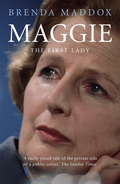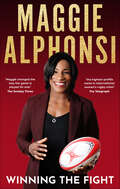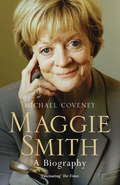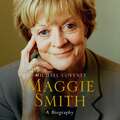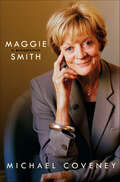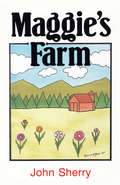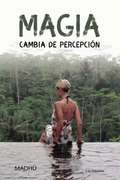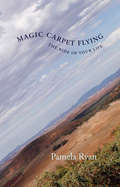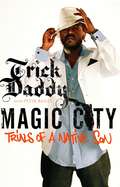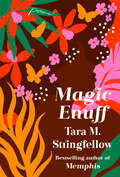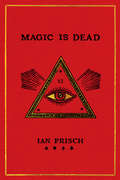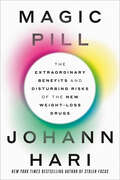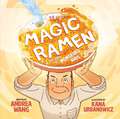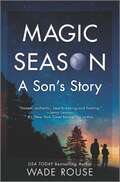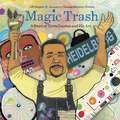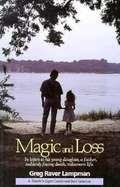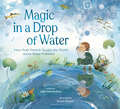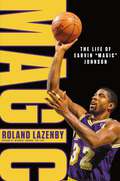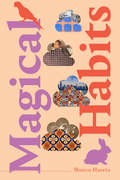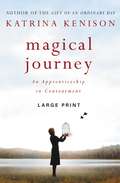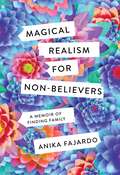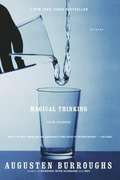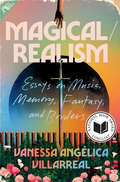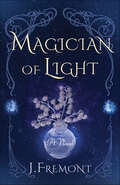- Table View
- List View
Maggie - The First Lady: The woman behind the title
by Brenda MaddoxWho was Margaret Thatcher? Her influence on politics is well documented - not least by Lady Thatcher herself. What no one has attempted before this book by award-winning biographer Brenda Maddox, is to present the personal story of the woman who has been described as 'the most significant Englishwoman since Elizabeth I'.Brenda Maddox traces the life of the grocer's daughter from Grantham who became the most successful Conservative Prime Minister of the twentieth century. Unprecedented access to people who knew her throughout her life, (some who have never spoken before) enables the author to paint a fully rounded portrait of a woman who - even after her death - is still both vilified and adored. Through the eyes of her contemporaries we begin to understand this extraordinary woman, whose shadow still falls accross British life.
Maggie - The First Lady: The woman behind the title
by Brenda MaddoxWho was Margaret Thatcher? Her influence on politics is well documented - not least by Lady Thatcher herself. What no one has attempted before this book by award-winning biographer Brenda Maddox, is to present the personal story of the woman who has been described as 'the most significant Englishwoman since Elizabeth I'.Brenda Maddox traces the life of the grocer's daughter from Grantham who became the most successful Conservative Prime Minister of the twentieth century. Unprecedented access to people who knew her throughout her life, (some who have never spoken before) enables the author to paint a fully rounded portrait of a woman who - even after her death - is still both vilified and adored. Through the eyes of her contemporaries we begin to understand this extraordinary woman, whose shadow still falls accross British life.
Maggie Alphonsi: Winning the Fight
by Maggie Alphonsi Gavin MairsMaggie has changed the way the game is played forever' - The Sunday Times Maggie Alphonsi is not only a national sporting icon, the face of international women’s rugby and star player of the England side that won the World Cup in 2014. She is also an inspirational and totemic figure who transcends sport. The compelling story of her life makes her achievements even more extraordinary. Hers is an against-all-the-odds tale, becoming the best player in the world despite having to battle against racism, sexism, and prejudice. It is a book forged from the raw emotion, passion, and testimony of an iconic player, who rose to the elite of world sport when the world was seemingly stacked against her. It is a moving and revealing story of a woman who was not prepared to be defined by anyone but herself and gives the reader a unique insight into how she met her goals.
Maggie Smith: A Biography
by Michael Coveney'Coveney is the only writer who could get under Smith's skin, capturing her steeliness and vulnerability' INDEPENDENT ON SUNDAYFrom her days as a star of West End comedy and revue, Dame Maggie's path has led to international renown and numerous accolades including two Academy Awards. Recently she has been as prominent on our screens as ever, with high-profile roles as the formidable Dowager Countess of Grantham in DOWNTON ABBEY, as Professor Minerva McGonagall in the HARRY POTTER movie franchise and as the eccentric Miss Shepherd in the film version of THE LADY IN THE VAN by Alan Bennett. Paradoxically she remains an enigmatic figure, rarely appearing in public and carefully guarding her considerable talent. Drawing on personal archives, interviews and encounters with the actress, as well as conversations with immediate family and dear friends, Michael Coveney's biography is a captivating portrait of the real Maggie Smith.
Maggie Smith: A Biography
by Michael CoveneyNo one does glamour, severity, girlish charm or tight-lipped witticism better than Dame Maggie Smith, one of Britain's best-loved actors. This new biography shines the stage-lights on the life and career of a truly remarkable performer, one whose stage and screen career spans six decades.From her days as a West End star of comedy and revue, Dame Maggie's path would cross with those of the greatest actors, playwrights and directors of the era. Whether stealing scenes from Richard Burton (by his own admission), answering back to Laurence Olivier, or impressing Ingmar Bergman, her career can be seen as a 'Who's Who' of British theatre in the twentieth century. This book also covers the little-known period in Canada, a prolific five-season run of leading roles that took place during the height of her success in Hollywood, soon after she won her first Oscar for her signature film The Prime of Miss Jean Brodie.Recently Dame Maggie has been prominent on our screens as ever, with high-profile roles as Violet Crawley, the formidable Dowager Countess of Grantham, in the phenomenally successful television series Downton Abbey, and as Professor Minerva McGonagall in the Harry Potter film franchise: what she herself describes as 'Miss Jean Brodie in a wizard's hat'. Yet paradoxically she remains an enigmatic figure, rarely appearing in public and carefully guarding her considerable talent. Michael Coveney's absorbing biography, written with the actress's blessing and drawing on personal archives, as well as interviews with immediate family and close friends, is therefore as close as it gets to seeing the real Maggie Smith.Read by Sian Thomas(p) 2015 Orion Publishing Group
Maggie Smith: A Biography
by Michael Coveney“Steeped in theater history” this biography “seamlessly melds Smith’s personal and professional lives into an engrossing narrative” (Kirkus Reviews).No one does glamour, severity, girlish charm or tight-lipped witticism better than Dame Maggie Smith. Michael Coveney’s biography shines a light on the life and career of a truly remarkable performer, one whose stage and screen career spans six decades.From her days as a West End star of comedy and revue, Dame Maggie’s path would cross with those of the greatest actors, playwrights and directors of the era. Whether stealing scenes from Richard Burton, answering back to Laurence Olivier, or playing opposite Judi Dench in Breath of Life, her career can be seen as a ‘Who’s Who’ of British theatre. Her film and television career has been just as starry. From the title character in The Prime of Miss Jean Brodie and the meddling chaperone in A Room With a View to the Harry Potter films in which she played Minerva McGonagall (as she put it ‘Miss Jean Brodie in a wizard’s hat’) and the Best Exotic Marigold Hotel films in which she played the wise Muriel Donnelly, Smith has thrilled, engaged and made audiences laugh. As Violet Crawley, the formidable Dowager Countess of Downton Abbey she conquered millions more. Paradoxically she remains an enigmatic figure, rarely appearing in public.Michael Coveney’s absorbing biography, written with the actress’s blessing and drawing on personal archives, as well as interviews with immediate family and close friends, is a portrait of one of the greatest actors of our time.
Maggie's Farm
by John SherryAt times hilarious, at other times thoughtful, this book is more than an account of a family which goes to live on a farm. The events described here took the Sherry's deep into a terra incognita of the spirit as well as the land. It is that quality: the sense of adventure and of patterns being broken which gives Maggie's Farm a flavor all its own.
Magia: Cambia de percepción
by Madhú¡Una guía raw & trendy para vivir libre, radiante y feliz los 365 días! Comparto contigo las herramientas que aplico de forma diaria en mi vida. <P> <P>Esas que me han empoderado como mujer y me han permitido decir adiós a viejos patrones, recibir con los brazos abiertos un sinfín de oportunidades que me permiten vivir radiante, optimista y feliz. <P>La práctica diaria de la meditación y asanas de yoga, junto con una dieta vegana, han activado la magia en mi vida. La magia entendida como el cambio de percepción que te permite ver y sentir todo de forma radicalmente diferente. <P><P> ¡Te animo a que tú hagas lo mismo! Me abro y te cuento de forma sincera y sin pudor algunos de los obstáculos por los que pasé durante algunos años de mi vida y lo importantes que han sido en mi caso la práctica constante y diaria de varias herramientas que he ido poniendo en práctica gracias a mis viajes constantes a Asia y al conocer a personasinfluyentes en el área del bienestar. <P><P>En este libro comparto muchas técnicas que estoy convencida que aportan bonanza y felicidad a todas las personas. Deseo que te inspire para poder vivir más libre y feliz, vital: sin ansiedad ni miedos.
Magic Carpet Flying: The Ride of Your Life
by Pamela RyanMagic Carpet Flying traces psychologist Pamela Ryan’s journey through her life’s adventures, from the rapture of achievement to the personal anguish of loss. Drawing on childhood lessons in rural Australia and later work in the Australian outback, Africa, Asia, and other parts of the world where she travelled to help others tackle the darkness of mental illness, suicide, and large-scale tragedy arising from terrorist attacks and natural disasters, Ryan reveals how she not only survived trauma but turned her journey into a "magic carpet ride." Exploring what it is to "live truth," to "make ourselves up as we go along," to aim for the stars, and to become the "pilot in command" of our own destiny, Pamela Ryan’s unforgettable journey in Magic Carpet Flying reveals what it means to be fully alive.
Magic City: Trials of a Native Son
by Peter Bailey Trick Daddy"A thug is someone who stands on his own. He lives by the decisions he makes and accepts the consequences. A thug is comfortable in his own skin. I wear mine like a glove." Trick Daddy was born a thug--just a stone's throw from downtown Miami, yet a world away from its dazzling beauty and sparkling wealth. Where grinding poverty, deadly crime, and devastating racial tension taught kids to live by the 'hood rules. Remarkably, Trick came from nothing and made it big just when his chances had run out. Magic City is the extraordinary tale of a boy whose father was a pimp, who learned to hustle to survive, and whose only role model was his brother, the drug dealer he watched plying his trade on the block. It's the untold truth behind the cult movie Scarface, of the drug money that transformed the city into a shining mecca for the rich and famous while turf wars between smalltime pushers claimed countless lives. It's also the incredible story of how that potent mixture of extremes--the electric pulse and glittering abundance of South Beach and the crime, corruption, and despair in its shadows--gave rise to the most dominant sound in hip-hop today. Magic City is an ode to Miami, a riveting tale of a paradise lost and a native son determined to infuse it with new life.
Magic Enuff: Poems
by Tara M. StringfellowRadiant poems that celebrate Black Southern womanhood and the many ways magic lives in the bonds between mothers, daughters, and sisters, from the bestselling author of Memphis.&“A gorgeous collection exploring the bond and beauty of Black womanhood.&”—Warsan Shire, author of Bless the Daughter Raised by a Voice in Her Head&“God can stay asleep / these women in my life are magic enuff&” An electrifying collection of poems that tells a universal tale of survival and revolution through the lens of Black femininity. Tara M. Stringfellow embraces complexity, grappling with the sometimes painful, sometimes wonderful way two conflicting things can be true at the same time. How it&’s possible to have a strong voice but also feel silenced. To be loyal to things and people that betray us. To burn as hot with rage as we do with love.Each poem asks how we can heal and sustain relationships with people, systems, and ourselves. How to reach for the kind of real love that allows for the truth of anger, disappointment, and grief. Unapologetic, unafraid, and glorious in its nuance, this collection argues that when it comes to living in our full humanity, we have—and we are—magic enough.
Magic Is Dead: My Journey into the World's Most Secretive Society of Magicians
by Ian FrischA journalist recounts his life-changing journey through the secret world of underground magic in this “funny, illuminating, and personal” memoir (Brooklyn Rail)When struggling journalist Ian Frisch came across magician Chris Ramsey on Instagram, he knew he had the makings of a good story. But what began as a simple profile piece led Ian to the52—a secret society of magicians determined to revolutionize their ancient artform under the mantra Magic Is Dead.As Ian gains entry to the52, he forms close bonds with its founding members—Laura London, Daniel Madison, and Chris Ramsay. He attends private gatherings of the most extraordinary magicians working today, follows them to magic conventions in Las Vegas and England, and discovers some of the best tricks of the trade. He also goes behind the scenes of a Netflix magic show and encounters David Blaine, Penn Jillette, and Dynamo, the U.K.’s most famous magician.As Ian tells the story of the52, and his role as its most unlikely member, he reveals his own connection with trickery and deceit, sharing how he first learned the elements of magic from his poker-playing mother. Rich with the history of magic and populated with a cast of fascinating characters, Magic Is Dead is a page-turning work of immersive journalism coupled with a young man searching for himself.
Magic Pill: The Extraordinary Benefits and Disturbing Risks of the New Weight-Loss Drugs
by Johann HariThe bestselling author of Lost Connections and Stolen Focus offers a revelatory look at the new drugs transforming weight loss as we know it—from his personal experience on Ozempic to our ability to heal our society&’s dysfunctional relationship with food, weight, and our bodies.In January 2023, Johann Hari started to inject himself once a week with Ozempic, one of the new drugs that produces significant weight loss. He wasn&’t alone—some predictions suggest that in a few years, a quarter of the U.S. population will be taking these drugs. While around 80 percent of diets fail, someone taking one of the new drugs will lose up to a quarter of their body weight in six months. To the drugs&’ defenders, here is a moment of liberation from a condition that massively increases your chances of diabetes, cancer, and an early death. Still, Hari was wildly conflicted. Can these drugs really be as good as they sound? Are they a magic solution—or a magic trick? Finding the answer to this high-stakes question led him on a journey from Iceland to Minneapolis to Tokyo, and to interview the leading experts in the world on these questions. He found that along with the drug&’s massive benefits come twelve significant potential risks. He also found that these drugs radically challenge what we think we know about shame, willpower, and healing. What do they reveal about the nature of obesity itself? What psychological issues begin to emerge when our eating patterns are suddenly disrupted? Are the drugs a liberation or a further symptom of our deeply dysfunctional relationship with food? These drugs are about to change our world, for better and for worse. Everybody needs to understand how they work—scientifically, emotionally, and culturally. Magic Pill is an essential guide to the revolution that has already begun, and which one leading expert argues will be as transformative as the invention of the smartphone.
Magic Ramen: The Story of Momofuku Ando
by Andrea WangWorld War II was over, but in Japan, lines for a simple bowl of ramen noodles wound down the sidewalk. What Momofuku Ando did next would change food forever. Andrea Wang, author of Watercress (a Newberry honor book and winner of the Caldecott Medal), tells the true story behind the creation of one of the world's most popular foods."An inspiring story of persistence and an ideal purchase for any collection." School Library Journal, STARRED review2021 Nutmeg Book Awards NomineeWinner of the 2020 Sakura AwardRead Across America Book of the Month, May 2021Center for Multicultural Children's Literature Best Book of 2019 ListSmithsonian Magazine '10 Best Children's Books of 2019′ ListEvery day, Momofuku Ando would retire to his lab--a little shed in his backyard. For years, he'd dreamed about making a new kind of ramen noodle soup that was quick, convenient, and tasty for the hungry people he'd seen in line for a bowl on the black market following World War II. Peace follows from a full stomach, he believed.Day after day, Ando experimented. Night after night, he failed. But Ando kept experimenting.With persistence, creativity, and a little inspiration, Ando succeeded. This is the true story behind one of the world's most popular foods.
Magic Season: A Son's Story
by Wade Rouse"Honest, authentic, heartbreaking and healing. I devoured it in one day."—Jenny Lawson, #1 New York Times bestselling author Bestselling author Wade Rouse finds solace with his dying father through their shared love of baseball in this poignant, illuminating memoir of family and forgiveness.Before his success in public relations, his loving marriage and his storied writing career, Wade Rouse was simply Ted Rouse's son. A queer kid in a conservative Ozarks community, Wade struggled at a young age to garner his father's approval and find his voice. For his part, Ted was a hard-lined engineer, offering little emotional support or encouragement. But Wade and Ted had one thing in common: an undying love of the St. Louis Cardinals.For decades, baseball offered Wade and his father a shared vocabulary—a way to stay in touch, to connect and to express their emotions. But when his father's health takes a turn for the worst, Wade returns to southwest Missouri to share one final season with his father. As the Cards race towards a dramatic pennant race, Wade and his father begin to open up in way they never thought possible. Together, inning by inning during their own magic season, they'll move towards forgiveness, reconciliation, and peace.Heartfelt, hilarious and lovingly rendered, Magic Season is an unforgettable story of love, family and forgiveness against the backdrop of America's favorite pastime.
Magic Trash: A Story of Tyree Guyton and His Art
by J. H. ShapiroVacant lots. Abandoned houses. Trash--lots of trash. Heidelberg Street was in trouble!Tyree Guyton loved his childhood home--that's where his grandpa Sam taught him to "paint the world." So he wanted to wake people up... to make them see Detroit's crumbling communities.Paintbrush in hand, Tyree cast his artistic spell, transforming everyday junk into magic trash. Soon local kids and families joined Tyree in rebuilding their neighborhood, discovering the healing power of art along the way.This picture book biography of Tyree Guyton, an urban environmental artist, shows how he transformed his decaying, crime-ridden neighborhood into the Heidelberg Project, an interactive sculpture park. The story spans from Tyree's childhood in 1950s Detroit to his early efforts to heal his community through art in the 1980s. Tyree's awards include Michigan Artist of the Year and International Artist.MAGIC TRASH offers strong themes of working together, the power of art, and the importance of inspiring community--especially kids--to affect action. The Heidelberg Project is internationally recognized for providing arts education to children and adults and for the ongoing development of several houses on Heidelberg Street. Not only does the Heidelberg Project prove that when a community works together it can rebuild itself, but it also addresses the issues of recycling, environmentalism, and community on a global level.
Magic and Loss: In Letters to His Young Daughter, a Father, Suddenly Facing Death, Rediscovers Life
by Greg Raver LampmanAt age 37, journalist Lampman discovered that he was dying from a brain tumor and began writing these letters to his three-year-old adopted daughter, Emmy. Along with stories of good family times are the details of convulsions, MRIs, surgery, and radiation therapy--"The tumor has been removed, but the doctors fear it will grow back, only time will tell." His references to his wife as "mommy" are natural, considering the letters are addressed to his young daughter, but cloying nonetheless. Perhaps he makes the most definitive statement of his feelings when he writes, "I remember I used to hear a siren, or see an ambulance, and wonder whether there was some story I should chase. Now, I hear a siren and feel a pang of empathy." When his editors encouraged him to publish some of the letters, he was inundated with responses and so this book evolved and has been selected by Reader's Digest for its Christmas-issue condensed book section.
Magic in a Drop of Water: How Ruth Patrick Taught the World about Water Pollution
by Julie WinterbottomAn entertaining and gorgeous picture book biography of scientist and environmental hero Ruth Patrick, one of the first to warn about the dangers of pollution.A brilliant scientist and intrepid explorer, the ecologist Ruth Patrick taught the world how to care for the environment. She studied water pollution long before it became a public concern and gave other scientists the tools to do something about it. Born in 1907, Ruth Patrick was one of the only women in her field when she made her breakthrough discovery about biodiversity and the ecosystem of rivers, forever changing how ecologists understand pollution.Lyrically, joyfully written, exquisitely illustrated, and full of fascinating details and a rich afterword and timeline, this STEM biography will inspire readers who love the environment to follow their passion and curiosity.
Magic: The Life of Earvin “Magic” Johnson
by Roland LazenbyThe definitive biography of the basketball legend Earvin “Magic” Johnson, from the highly respected, career sportswriter and author of Michael Jordan: The Life.Magic Johnson is one of the most beloved, and at times controversial, athletes in history. His iconic smile lifted the dowdy sport of American professional basketball from a second-tier sport with low ratings into the global spotlight—a transformation driven by Magic’s ability to eviscerate opponents with a playing style that featured his grand sense of fun. He was a master entertainer who directed the Los Angeles “Showtime” Lakers to the heights of both glory and epic excess, all of it driven by his mind-blowing no-look passes and personal charm.Then, in 1991, at the height of his charismatic power, Johnson shocked the world with a startling cautionary tale about sexually transmitted disease that pushed public awareness of the HIV/AIDS crisis. Then out came his confession of unprotected sex with hundreds of women each year, followed by his retirement, an attempted return, and a proper farewell on the iconic 1992 Olympic Dream Team.Longtime biographer Roland Lazenby spent years tracking the unlikely ascension of Johnson—an immensely popular public figure who was instantly scandalized but who then turned to his legendary will to rise again as a successful entrepreneur with another level of hard-won success. In Lazenby’s portrayal, Johnson’s tale becomes bigger than that of one man. It is a generational saga spanning parts of three centuries that reveals a great deal, not just about his unique basketball journey but about America itself.Through hundreds of interviews with Johnson’s coaches, representatives past and present, teammates, opponents, friends, and loved ones, as well as key conversations with Johnson himself over the years, Lazenby has produced the first truly definitive study, both dark and light, of Earvin “Magic” Johnson, Jr.—the revolutionary player, the icon, the man.
Magical Habits (Writing Matters!)
by Monica HuertaIn Magical Habits Monica Huerta draws on her experiences growing up in her family's Mexican restaurants and her life as a scholar of literature and culture to meditate on how relationships among self, place, race, and storytelling contend with both the afterlives of history and racial capitalism. Whether dwelling on mundane aspects of everyday life, such as the smell of old kitchen grease, or grappling with the thorny, unsatisfying question of authenticity, Huerta stages a dynamic conversation among genres, voices, and archives: personal and critical essays exist alongside a fairy tale; photographs and restaurant menus complement fictional monologues based on her family's history. Developing a new mode of criticism through storytelling, Huerta takes readers through Cook County courtrooms, the Cristero Rebellion (in which her great-grandfather was martyred by the Mexican government), Japanese baths in San Francisco—and a little bit about Chaucer too. Ultimately, Huerta sketches out habits of living while thinking that allow us to consider what it means to live with and try to peer beyond history even as we are caught up in the middle of it.Duke University Press Scholars of Color First Book Award recipient
Magical Journey: An Apprenticeship in Contentment
by Katrina Kenison"No longer indispensable, no longer assured of our old carefully crafted identities, no longer beautiful in the way we were at twenty or thirty or forty, we are hungry and searching nonetheless." From the author of The Gift of an Ordinary Day, this intimate memoir of loss, self-discovery, and growth will resonate deeply with any woman who has ever mourned the passage of time, questioned her own purpose, or wondered, "Do I have what it takes to create something new in my life?" With the candor and warmth that have endeared her to readers, Kenison reflects on the inevitable changes wrought by time: the death of a dear friend, children leaving home, recognition of her own physical vulnerability, and surprising shifts in her marriage. She finds solace in the notion that midlife is also a time of unprecedented opportunity for growth as old roles and responsibilities fall away, and unanticipated possibilities appear on the horizon. More a spiritual journey than a physical one, Kenison's beautifully crafted exploration begins and ends with a home, a life, a marriage. But this metamorphosis proves as demanding as any trek or pilgrimage to distant lands-it will guide and inspire every woman who finds herself asking "What now?"
Magical Realism for Non-Believers: A Memoir of Finding Family
by Anika FajardoA young woman from Minnesota searches out the Colombian father she&’s never known in this powerful exploration of what family really means He loved Colombia too much to leave it. The explanation from her Minnesotan mother was enough to satisfy a child&’s curiosity about her missing father. But at twenty-one, Anika Fajardo wanted more. She wanted to know her father better and to know what kind of country could have such a hold on him. And so, in 1995, Fajardo boarded a plane and flew to Colombia to discover a birthplace that was foreign to her and a father who was a stranger. There she learns that sometimes, no matter how many pieces you find, fitting together a family history isn&’t easy.With her tentative entry into her father&’s world, Fajardo steps on a path that will take her in surprising directions, toward unsuspected secrets about her family and herself. Set against the changing backdrops of Colombia and the American Midwest, her journey carries her back to the 1970s and the beginnings of her parents&’ broken marriage, and forward to the present day, where the magic and reality of love and heartache—and her own experience as a parent—await her. The way is strewn with obstacles, physical and metaphysical—from the perils encountered on a mountain road in Colombia to the death of a loved one to the birth of her own child—but the toughest to negotiate are the shifting place of memory and truth while coming to understand her place in her family and in the world.Vivid and heartfelt in the telling, Fajardo&’s story is powerfully compelling in its bridging of time and place and in its moving depiction of self-transformation. Family, she comes to find, is where you find it and what you make of it.
Magical Thinking: True Stories
by Augusten BurroughsMore stories from Burroughs's weird childhood to his neurotic adulthood, hilarious, wicked and heart-breaking.
Magical/Realism: Essays on Music, Memory, Fantasy, and Borders
by Vanessa Angélica VillarrealA brilliant, singular collection of essays that looks to music, fantasy, and pop culture—from Beyoncé to Game of Thrones—to excavate and reimagine what has been disappeared by migration and colonialism. Upon becoming a new mother, Vanessa Angélica Villarreal was called to Mexico to reconnect with her ancestors and recover her grandmother&’s story, only to return to the sudden loss of her marriage, home, and reality. In Magical/Realism, Villarreal crosses into the erasure of memory and self, fragmented by migration, borders, and colonial and intimate violence, reconstructing her story with pieces of American pop culture, and the music, video games, and fantasy that have helped her make sense of it all. The border between the real and imagined is a speculative space where we can remember, or re-world, what has been lost—and each chapter engages in this essential project of world-building. In one essay, Villarreal examines her own gender performativity through Nirvana and Selena; in another, she offers a radical but crucial racial reading of Jon Snow in Game of Thrones; and throughout the collection, she explores how fantasy can help us interpret and heal when grief feels insurmountable. She reflects on the moments of her life that are too painful to remember—her difficult adolescence, her role as the eldest daughter of Mexican immigrants, her divorce—and finds a way to archive her history and map her future(s) with the hope and joy of fantasy and magical thinking. Magical/Realism is a wise, tender, and essential collection that carves a path toward a new way of remembering and telling our stories—broadening our understanding of what memoir and cultural criticism can be.
Magician of Light: A Novel
by J FremontFor fans of Marie Benedict, Lauren Willig, and Diana Gabaldon, comes a Gothic romance about the charming and ambitious glassmaker René Lalique, the mysterious Englishwoman he falls in love with and their haunting encounters. Fascinated by the occult, René feels stifled, apprenticed to a traditional jeweler. Yearning for the creative freedom to explore the mythical world in his art, he leaves Paris to study at the Crystal Palace outside London. There, he meets Lucinda Haliburton and her dysfunctional family. Having returned from an archaeological dig and tomb discovery in Egypt, Lucinda believes she is preyed upon by ancient spirits. Rene finds her unearthly situation both enchanting and frightening. Is it imagination, delusional, or a real ghostly encounter? Magician of Light illuminates the dark side of Lalique’s life while spinning a suspenseful tale of twisting fates. An enthralling love story filled with historical intrigue and overshadowed by the unknowable.
